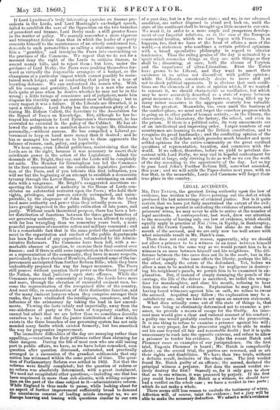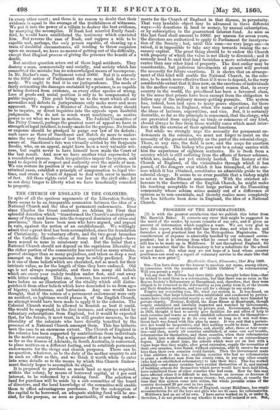LEGAL ACCIDENTS.
Mn. Prrr TAYLOR, the greatest .living authority upon the law of evidence, has written to the Times pointing out the defect which produced the last miscarriage of criminal justice. Nor is it quite certain that we have yet fully ascertained the extent of the evil.; and so long as we persist in excluding the evidence of prisoners, and lrisoners' wives, we may never be able to arrive at the number of egal accidents. A correspondent, last week, drew our attention to the necessity of having only one law of evidence, which should equally apply in practice at Nisi i'rius, in Equity, in Bankruptcy, and in the Crown. Courts. In the last alone do we close the mouth of the accused, and we are only now too well aware with what miserable result in Mr. Hatch's case.
There does not exist any reason, apparently, why we should not allow a prisoner -to be a witness in an issue between himself and the Crown, in the same way as we would permit him to be a witness in an issue between himself and his neighbour. The dif- ference between the two cases does not lie in the tnodc, but in the subject of inquiry. One issue affects the liberty, perhaps the life; the other, simply the estate of the defendant. Yet, before we allow a man to be mulcted in damages for negligence in destroy- ing his neighbour's panels, we permit him to be examined in ex- planation. But, if instead of simply damaging the panels of thO carriage, the life of the driver is sacrificed, we indict the wrong- doer for manslaughter, and close his mouth, refusing to hear from him one word of evidence. Explanation he may give ; but having heard witnesses against him on oath, we refuse to swear the accused. Acquittal may follow ; the explanation may be a satisfactory one, only we have to act upon an unworn statement.
What does actually come out of this state of things is, that from our being so obstinately determined not to examine a pri- soner, we provide a means of escape for the Guilty. An inno- cent man would give a clear and rational account of his conduct ; a guilty one would probably confirm the case for the prosecution. It is one thing to refuse to examine a prisoner against his will; that is very proper, for the prosecutor ought to be able to make out his case beyond all fair and reasonable doubt; but it is quite unnecessary to rush into the opposite extreme, and refuse to allow a prisoner to tender his evidence. Take the recent Hatch and Plummer cases as examples of our jurisprudence. On the first trial, Eugenia Plummer is heard ; Mr. Hatch is compulsorily silent; on the second trial, the parties are reversed, and so are their rights and disabilities. We have then two trials, without a definite result, inclusive of the whole cape. The first verdict found Mr. Hatch guilty of an offence; the second, declared the
principal witness a perjurer. But does the second verdict en- tirely destroy the first? Scarcely so, for it only goes to show that as to one witness, it was procured by perjury. If the first jury could have heard Mr. Hatch' as a witness, we should have had a verdict op the whole Case ; we have a verdict in two parts ; which do not make a whole. There eeeini itilliess.reason to exclude the testimony of wives, Affection will, of course, taint the evidence; but a jury will able to make the necessary deduction. We'admit a wife's evidena
in every other court ; and there is no reason to doubt that their evidence is equal to the average of the truthfulness of witnesses. We put it into the power of a villain to destroy the best evidence, by marrying the accomplice. If Rush had married Emily Sand- ford, he would have annihilated the testimony which convicted him. But reverse the case of Rush, and suppose a wife to be capable and, perhaps, the only person capable, of clearing up a train of doubtful circumstances, all tending to throw suspicion upon an accused, we have no means of getting out of the difficulty, except that illogical process of giving the prisoner the benefit of' a doubt.
But another question arises out of these legal accidents. They destroy, a man, commercially and socially, and society which has committed the mistake has no acknowledged means of recompense. In Mr. Barber's case, Parliament voted 50001. But it is scarcely to the fitful action of Parliament that we must look for the re- medy. We ought to find it in our jurisprudence. The mode of fairly estimating the damages sustained by a prisoner, is as capable of being derived from evidence, as every other species of wrong. Loss of goods and social position is only to be compensated by public inquiry. This point brings us to the want which all our anomalies and defects in jurisprudence only make more and more apparent. We require a Minister of Justice, whose duty should be to inquire, or direct inquiries into the appeals upon doubtful judgments. We do not so much want machinery, as motive power to set what we have in motion. The Judicial Committee of the Privy Council, perhaps the greatest court of appeal we have in strength of legal intellect, is ready-made for the purpose. No trouble or expense should be grudged to purge our law of its defects ; such cases as those of Smethurst and Hatch do more to under- mine the very foundations of law than superficial observers are aware of. Smethurst's fate was virtually settled by Sir Benjamin Brodie, who, on an appeal, might have been a very valuable wit- ness, but ought never to have himself been made the Court of the last resort. And now we have another trial superseded by a roundabout process. Such irregularities impair the system, and tend to deprive it of respect and authority over the minds of men. We can restore its position if we enlarge our law of evidence in criminal cases, establish a principle of compensation to legal vic- tims, and create a Court of Appeal to deal with error in matters of fact. All these rights exist in our law on the civil side ; let us not deny longer to liberty what we have beneficially conceded to property.



























 Previous page
Previous page